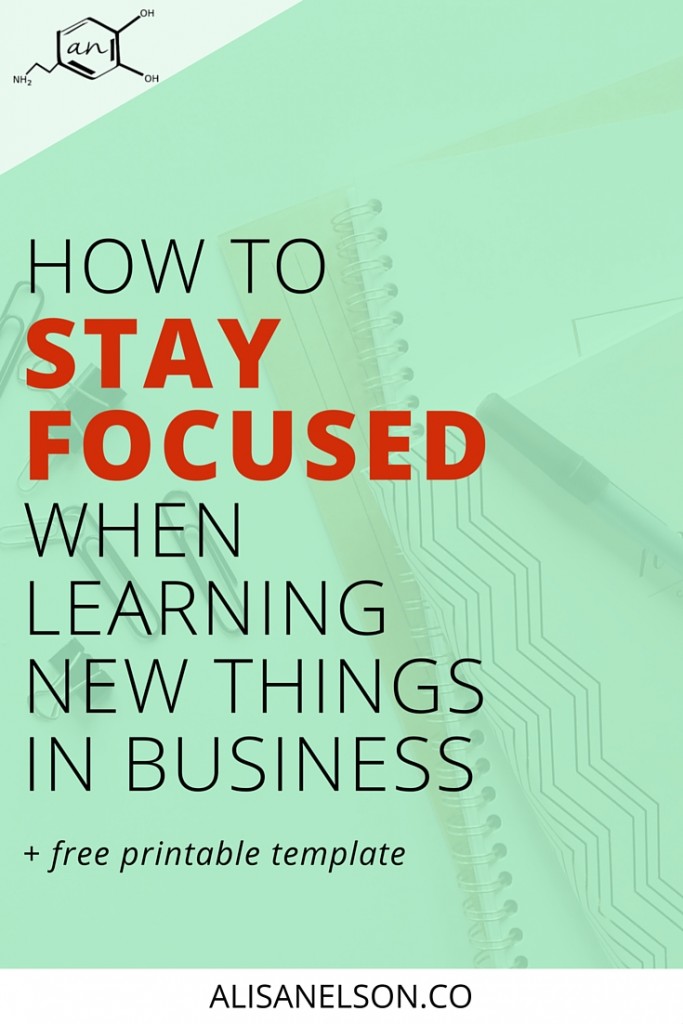Learning new skills and establishing your footing is essential to surviving in business. But how do you stay focused in a world of information overload?
Let’s say you’re thinking about developing some new products to begin scaling your business efforts and you need to really understand content marketing so you can form a strategy and implement. How often do you head for Google only to find yourself in a rabbit hole in 2 minutes flat? When you finally emerge, you’re signed up for 5 more email lists yet no closer to actually understanding the issue at hand.
In recent posts we’ve talked about the importance of effective problem-solving — when you look at each of these questions (what is content marketing and how does it apply to my business?) as a problem to solve, you increase the likelihood you’ll actually get the answers you need.
In today’s post we’re talking about how to stay focused within the miry bog of the internet. It’s tough work to separate the genuine signal from the noise and on top of all the useless information, you’ve got your own brain to consider. So that’s where I’m coming in – brain science meets creative biz life is where I thrive after all.
Cognitive load refers to the capacity of a person’s working memory. The associated theory is applied to learning environments in order to optimize for a common human shortcoming – we can only handle so much new information at one time. Add another layer of ideas to remember without a system in place and you’re bound for information overload.
Luckily, scientists have found useful methods for processing new information and keeping cognitive load low but it’s likely that you’re not employing these methods as you rapidly scroll through google search results.
Here are 12 tips to help you stay focused as you head off to learn new things:
Building awareness
- Know your signs of overload — It may be feeling angry or overstimulated during or after your work or perhaps your mind goes a little numb and you head for Facebook and start reading unimportant – but funny – posts about hipster princesses.
- Know your triggers to overload — Are you trying to multitask? Are you tired? Are you diving into google search before you’ve even really thought about the problem? Which behaviors do you see coming before you overload happens?
- Know how you learn best — If you’re a visual learner but your main source of learning is a podcast you’re going to have trouble processing the information given. Maybe you need to take notes at the same time (whether listening or reading). Maybe you need to map out the problem with pen+paper before you can sit down at your computer.
- Practice bookmarking or pinning potential resources — We’ve all been there – you’re looking at one post and the author is smart and has back-linked to a different post. It might be interesting but if it’s not actually related to the problem YOU are trying to solve, save it for later. No need to quick learn that information – it’s not going anywhere.
Know the problem
- Get clear about the big question
- Brainstorm a list of words / concepts related to that big question
- Build a list of anchor concepts – the big principles that go beyond online business – to help you sort new information as it comes (useful or not?)
- Break it into small chunks so you can search in smaller doses with more specific questions
- Have a clear objective for each of those small dose searches
Pin these related posts for later:
4 steps to problem-solving like a pro
How to stop obsessing over social media
Assess for new understanding
- Know your intended action (plan to act!) to hold yourself accountable
- Stay present – checking each new piece of information against the problem / objective (have you solved it yet? Are you staying on task? Are things getting clearer or more confusing?)
- Relate what you are learning to what you already know – use those anchor principals and your previous understanding to integrate new ideas into your schema. (Move from working memory to long term memory).
How this helps your focus problem
Overload tends to lead to being lost, stuck, or confused. And those are three words you do not want describing your work day. Those words lead to more awful words like procrastination. They lead to dwelling on the unimportant information and tasks that won’t move your business forward. They lead to premature decisions based on incomplete information because you just want to get it over with. You start telling yourself “Just do something!” yea?
Pin this related post for later:
4 mindsets killing your consistency
Following the tips above will help you stay focused on the bigger picture – and the actual problem – while wading into the world of google. They will help you start to systematize your problem-solving, which in turn helps you to stay on top of all the essential tasks of being an entrepreneur. There will always be problems and with a plan (and your free template!!) you can keep solving them like a boss while you wear all the hats / spin all the plates / keep all the balls in the air.
